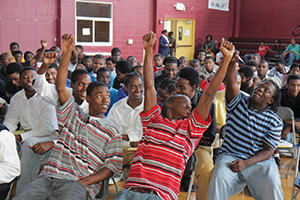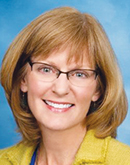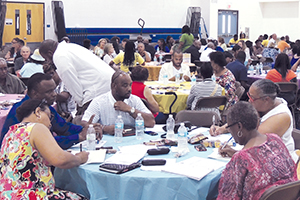By NANCY FRAZIER O'BRIEN
At first glance, Betty Bradwell and Trayvon Davis might seem to have little in common.
But Bradwell, a 63-year-old retired police employee, and Davis, a 35-year-old former convict turned youth mentor, share a deep concern for the Lincoln Park neighborhood of Fort Pierce, Fla. Both also feel a sense of gratitude toward Allegany Franciscan Ministries for the Catholic foundation's efforts to improve life in their community.

Residents of Overtown, Fla., an urban area near Miami, told Allegany Franciscan Ministries in an August meeting that the community needs jobs and productive opportunities for youth. Here, students attend a 2014 assembly for the Overtown Youth Center Summer Career Training Program.
The nonprofit organization, part of Trinity Health, has begun a process it calls the Common Good Initiative in the three Florida regions where it has been making grants to improve community health since 1998 — Miami, Tampa Bay and Palm Beach, the region where Fort Pierce is located.
Street sense
"The board wanted to look at what options we have for going beyond our traditional grant-making work," said Eileen Coogan Boyle, president and chief executive of Allegany Franciscan Ministries. "We ultimately decided to have a place-based approach, trying to follow the community's direction."
That approach models the work of the Franciscan Sisters of Allegany, N.Y., who "have always gone where the needs are and listened to the people," Boyle said. Allegany Franciscan Ministries works in the three regions of Florida formerly served by the religious order's hospitals, and the organization's endowment comes in part from the sale of those hospitals to what is now Trinity Health.
The term "common good" refers to the Catholic social teaching that calls for the pursuit of "social conditions which allow people ... to reach their fulfillment more fully and more easily," according to the 2004 Compendium of the Social Doctrine of the Church.

Boyle
"Our Catholic identity and our connection to the sisters puts us at ground zero with the community, rather than in the ivory tower that a foundation can sometimes become," Boyle said.
Active listening
The goal of the initiative, according to a June report, is to "partner with specific neighborhoods to create healthier, safer and more prosperous places in which our most vulnerable residents can live, learn, work and play."
The heart of the Common Good Initiative is the community dialogues in each region, designed to elicit the top concerns in each neighborhood and develop ideas for how best to address those concerns.
Bradwell and Davis were among an estimated 170 people who attended the three-hour Lincoln Park dialogue this summer. The second took place Aug. 20 in the Overtown neighborhood of Miami, while the third is scheduled for some time in October in Wimauma Village near Tampa.
The neighborhood priorities that emerged from the Lincoln Park meeting were quality jobs with livable wages, a safe and healthy community, lower rates of chronic diseases and better relations between the community and the police.
Positive influence
Davis, who described himself as "once a troubled teen who wound up in prison," brought several at-risk young men to the dialogue, saying it was important for them to see something positive happening in the community and to know that their opinion is valued.
"A lot of the younger generation is not aware of how instrumental they are to the community," he said. "They can be a huge asset — or a huge liability."
Davis said positive images are needed to counteract the bad influences of music, television, the Internet and "the streets."
"They learn negatives everywhere, so when there is something positive I call them and say, 'You need to be here,'" he added. "The majority of them think they would much rather take the easy way out, but if there were more job opportunities, crime would be a lot less.
"If you can show someone something that they'd like to achieve, you can get a lot of cooperation from them," Davis said.
Power of connection
Bradwell, who has lived in Lincoln Park longer than Davis has been alive, said she has seen many changes in the neighborhood over the past 35 years — some for the better, but many for the worse.

About 150 residents of Lincoln Park, Fla., meet in June to establish their priorities for Allegany Franciscan Ministries' involvement in community betterment programs. Quality jobs paying living wages and safe and healthy neighborhoods top their list.
"This dialogue will help whole families," she said. "The at-risk children and their at-risk parents need to be retrained to be qualified for good jobs."
She said Allegany Franciscan Ministries and Upendo Shabazz-Phillips, vice president for its Palm Beach region, have been key players in efforts toward "restoring the village" through previous grants and a continued presence in the neighborhood.
Shabazz-Phillips said her role in the Common Good Initiative has been "community reconnaissance" that helped organizations and individuals in Lincoln Park become better aware of what they each do and of what Allegany Franciscan Ministries could do to help.
"We have been facilitating meetings in the community with anyone who was leading a system in the Fort Pierce area and with local nonprofits," she said. "There has been a full year of that type of engagement" leading up to the community dialogue, she added.
Distinct characters, similar priorities
Boyle said the three neighborhoods chosen for the Common Good Initiative have some characteristics in common. All three have high percentages of people living in poverty and high rates of untreated diabetes, for example.
But it is the differences among the communities that she finds "really fascinating."
Wimauma Village is a rural, largely Hispanic neighborhood located 7 miles from the nearest social services and populated by many undocumented people, Boyle said. The residents in that isolated area have little in terms of "nonprofit or public service infrastructure" and "a lot of distrust for outsiders and the police," she added.
Overtown, on the other hand, is a "very urban," predominantly African-American community that has been "done to a lot" in terms of government interventions that had little long-term benefit to the neighborhood, Boyle said. "There have been lots of people trying to make a difference there," she said, but the community "has been ignored and oppressed in many ways."
Lincoln Park is "more a town than a city" and "the right-sized community to have a lot of community engagement," but still experiences a lack of resources, Boyle said, adding that all three neighborhood have similar priorities — safe and healthy communities with jobs available.
The next step for the Common Good Initiative will be to work with community leaders and local nonprofit and governmental agencies to come up with specific ways to meet the goals outlined in the dialogues.
"The process has been very slow," Boyle acknowledged. "But every step of the way we have been learning that the slow pace is the right pace. That's the real lesson for us."
Copyright © 2015 by the Catholic Health Association
of the United States
For reprint permission, contact Betty Crosby or call (314) 253-3477.